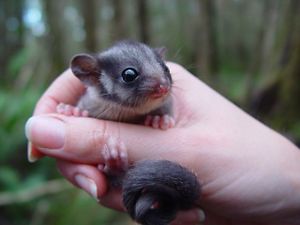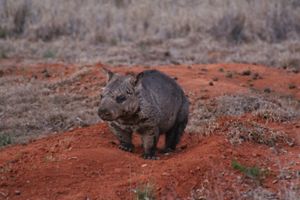Our Threatened Species are Counting on You
National Threatened Species Day, 7 September
Nothing is possible without your support
Our Australian wildlife and the places they call home need you now, more than ever.
DONATE NOW >In Australia, National Threatened Species Day, 7 September, is a reminder of how vulnerable life on Earth is. And we must do what we can to ensure their survival.
It's our country’s most important day of the year for drawing attention to the devastating threats facing our natural heritage.
Extinctions are not something that we can fix later. There are no technological fixes or magic potions to recover extinct fauna. Once a species is gone, it’s gone forever.
Death by a thousand cuts
Before the catastrophic mega bushfires of 2019/2020, our native wildlife were already struggling to survive. Land clearing here and there, invasive species like cats and foxes killing off our native species one by one, severe drought, and then the massive bushfires.
It’s death by a thousand cuts. No wonder more and more of our precious wildlife are finding themselves on the national threatened species list.
There are so many threats, but so little protection.
Quote
More than 70% of our species are not found anywhere else on earth. Any loss to Australia is also a loss to the world.

Animals like the incredibly cute Greater Glider. They have big, soft, fuzzy ears. Found along the forests of the east coast of Australia, about 30% of their habitat was burnt in the 2019/2020 mega bushfires.
They rely on a highly specialised diet, feeding mainly on leaves of certain eucalypt species. Sadly, they’re not able to survive for long periods without feeding.
Australia’s unique species are all counting on us for their survival. Just think — the amount you spend on your phone bill could make a real difference to the survival of unique Australian species. Can they call on you for help?
Time is Running Out For Our Threatened Species.
Please give generously to help give nature a fighting chance!
DONATE NOW >










Southern Corroboree Frog: Listed as Critically Endangered by the IUCN. This frog is unique as they produce their own poison rather than obtain it from their food source. © Mark Sanders, Flickr

Glossy Black Cockatoos: one of Australia’s rarest cockatoos. Flying in to drink during Australia's devastating bushfires of 2019/2020 © Bowerbirdaus

Purple Copper Butterfly : Listed as Endangered by the IUCN. It’s one of Australia’s rarest butterfly species. They’re only found in the Central Tablelands of NSW. © Stuart Cohen, DPIE EES

Western Ground Parrot: is an endangered species of parrot endemic to Western Australia. It is one of the world's rarest birds with about 150 individuals remaining. © Brent Barrett, Wikimedia Commons

Greater Glider: during Australia's 2019/2020 mega bushfires alone 30% of their habitat was destroyed © Matt Wright, Faunagraphic

Leadbeater's Possum: is a critically endangered possum largely restricted to small pockets of alpine ash, mountain ash, and snow gum forests in the Central Highlands of Victoria © D.Harley

Plains-wanderer (male): is a rare quail-like bird found in Riverina region of NSW © Patrick Kavanagh, Wikimedia Commons

Eastern Quoll: (Dasyurus hallucatus) Prince Regent River, WA Australia © Bruce Thomson/Auswildife

Northern Hairy-nosed Wombat: is one of the rarest land mammals in the world and is critically endangered. The fur on their noses sets them apart from the common wombat. © Queensland Government

Black-flanked Rock-wallaby: is an endangered species surviving in small isolated populations in Australia © John Spies
How can you help?
Make a special gift now. Your gift of $50, $75, $100 or more, would really make an impact.
DONATE NOW >Your gift of $50, $75, $100 or more, would really help boost the protection and conservation of wild habitat for struggling animals like the Greater Glider.
On your behalf, our team is working tirelessly to conserve our vital natural environment—because our ecosystems desperately need us.
When nature thrives, we thrive.
Your support is will help us protect more nature than ever. We’re doubling down on buying and protecting precious habitat, working with Traditional Owners to manage their land and reduce carbon emission, bringing back shellfish reefs and returning water to wetlands in the lower Murray Darling Basin.
We're grateful that everywhere we go, you are right there with us—protecting nature that we all rely on.
Nothing is possible without your support. You are the key to a brighter future.
This is your chance to act before we lose so much of what makes our country beautiful.
DONATE NOW >

Where your money goes
The Nature Conservancy (TNC) has been protecting the environment for around 70 years. From our historic work in land acquisition to cutting-edge research that influences global policy, TNC is constantly adapting to take on our planet’s biggest, most important challenges. Our vision is to create a world where people and nature can thrive. With your support, we can put the best conservation science into action right now.
In the last financial year, 84% of gifts have gone straight into conservation programs. We strive to ensure your vital donations make the largest impact for nature now and for the future of our planet.
